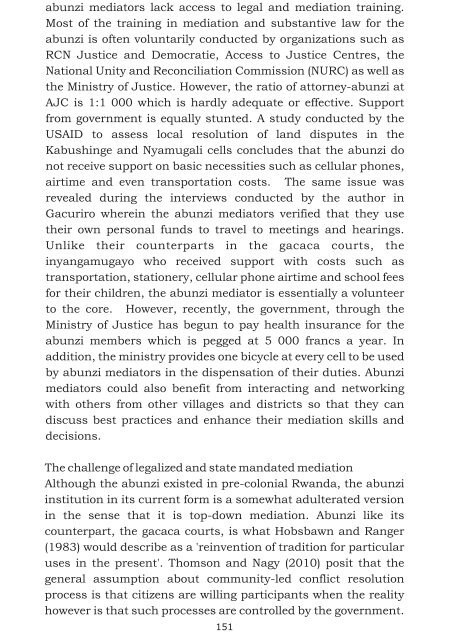Beneficiaries are actors too.pdf - Southern Institute of Peace ...
Beneficiaries are actors too.pdf - Southern Institute of Peace ...
Beneficiaries are actors too.pdf - Southern Institute of Peace ...
You also want an ePaper? Increase the reach of your titles
YUMPU automatically turns print PDFs into web optimized ePapers that Google loves.
abunzi mediators lack access to legal and mediation training.<br />
Most <strong>of</strong> the training in mediation and substantive law for the<br />
abunzi is <strong>of</strong>ten voluntarily conducted by organizations such as<br />
RCN Justice and Democratie, Access to Justice Centres, the<br />
National Unity and Reconciliation Commission (NURC) as well as<br />
the Ministry <strong>of</strong> Justice. However, the ratio <strong>of</strong> attorney-abunzi at<br />
AJC is 1:1 000 which is hardly adequate or effective. Support<br />
from government is equally stunted. A study conducted by the<br />
USAID to assess local resolution <strong>of</strong> land disputes in the<br />
Kabushinge and Nyamugali cells concludes that the abunzi do<br />
not receive support on basic necessities such as cellular phones,<br />
airtime and even transportation costs. The same issue was<br />
revealed during the interviews conducted by the author in<br />
Gacuriro wherein the abunzi mediators verified that they use<br />
their own personal funds to travel to meetings and hearings.<br />
Unlike their counterparts in the gacaca courts, the<br />
inyangamugayo who received support with costs such as<br />
transportation, stationery, cellular phone airtime and school fees<br />
for their children, the abunzi mediator is essentially a volunteer<br />
to the core. However, recently, the government, through the<br />
Ministry <strong>of</strong> Justice has begun to pay health insurance for the<br />
abunzi members which is pegged at 5 000 francs a year. In<br />
addition, the ministry provides one bicycle at every cell to be used<br />
by abunzi mediators in the dispensation <strong>of</strong> their duties. Abunzi<br />
mediators could also benefit from interacting and networking<br />
with others from other villages and districts so that they can<br />
discuss best practices and enhance their mediation skills and<br />
decisions.<br />
The challenge <strong>of</strong> legalized and state mandated mediation<br />
Although the abunzi existed in pre-colonial Rwanda, the abunzi<br />
institution in its current form is a somewhat adulterated version<br />
in the sense that it is top-down mediation. Abunzi like its<br />
counterpart, the gacaca courts, is what Hobsbawn and Ranger<br />
(1983) would describe as a 'reinvention <strong>of</strong> tradition for particular<br />
uses in the present'. Thomson and Nagy (2010) posit that the<br />
general assumption about community-led conflict resolution<br />
process is that citizens <strong>are</strong> willing participants when the reality<br />
however is that such processes <strong>are</strong> controlled by the government.<br />
151


